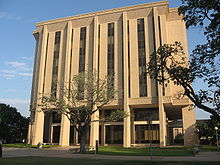Texas A&M College of Education and Human Development
This article relies too much on references to primary sources. (August 2021) |
The College of Education and Human Development is an academic college at Texas A&M University in College Station, Texas, United States. Founded in 1969, it is the fourth-largest college at the school, with an enrollment of over 6,000 student in its 22 undergraduate, 27 graduate, 13 doctoral, and nine certification programs. The college leads the state of Texas for most total certified teachers at a public institution.[1][2] As of 2021, the college is ranked #39 in the nation for best education schools, according to US News and World Report.[3] The college is made up of four departments and six facilities across the campus and cities of Bryan and College Station.
History[]
Prior to the establishment of the College of Education, Texas A&M still produced teachers, first in 1880.[4][5] In 1913 the first teaching certification program was established by Texas A&M for Horticulture.[4] Amidst numerous department changes and renamings, Texas A&M faculty expressed an interest in a school dedicated to teaching as early as 1920, and Texas A&M established the School of Vocational Teaching in 1924.[4][5] In 1959, Dr. Frank Hubert was selected as dean of the School of Arts and Sciences. With seven prior years at the Texas Education Agency, Hubert's leadership helped establish the College of Education and Human Development as a separate and distinct college for teaching in 1969 with the foresight and charisma of University President James Earl Rudder.[4][5]
The college quickly brought in faculty from established research universities and began researching how to incorporate technological innovations into education. By 1977, every program at the college was accredited up to the doctoral level by the National Council for Accreditation of Teacher Education.[4] In 1982, the school created the Dean’s Development Council in 1982 and secured new funding from corporate and private foundations. One of the charter members of the council, , established a scholar loan program which directly led to the college becoming a leader in the state for producing the most teachers for the fields of math and science.[4][6] This expansion of teacher production continued and, by 2020, the college led Texas public institutions for most total certified teachers.[1]
In 2019, the college began the first in-state postsecondary, four-year education program for students with intellectual and developmental disabilities.[7]
Departments[]

- Educational Psychology[8]
- Educational Administration and Human Resource Development[9]
- Health & Kinesiology[10]
- Teaching, Learning & Culture[11]
Deans of the College of Education and Human Development[]
| Deans[4] | Years served |
|---|---|
| 1969 - 1979 | |
| 1980 - 1989 | |
| 1990 - 1995 | Jane Stallings |
| 1996 - 2005 | Jane Close Conoley |
| 2006 - 2015 | Doug Palmer |
| 2015–present |
References[]
- ^ a b "Teacher Production Statewide by Organization and Certification Program". Texas Education Agency. March 5, 2020.
{{cite web}}: CS1 maint: url-status (link) - ^ "Coming Full Circle in the Classroom—and in Life—as an Aggie Teacher". 17 February 2020.
- ^ https://www.usnews.com/best-graduate-schools/top-education-schools/edu-rankings[bare URL]
- ^ a b c d e f g "Our History - 50 Years of Education and Human Development". Cehdturns50.tamu.edu. Retrieved 2021-08-19.
- ^ a b c "Texas A&M's College of Education and Human Development celebrates half a century".
- ^ https://today.tamu.edu/2015/07/27/trailblazers-june-scobee-83/
- ^ "Texas A&M Launches State's First Inclusive 4-Year College Program for Students with Disabilities".
- ^ Educational Psychology
- ^ Educational Administration and Human Resource Development
- ^ Health & Kinesiology
- ^ Teaching, Learning & Culture
- Texas A&M University
- 1969 establishments in Texas